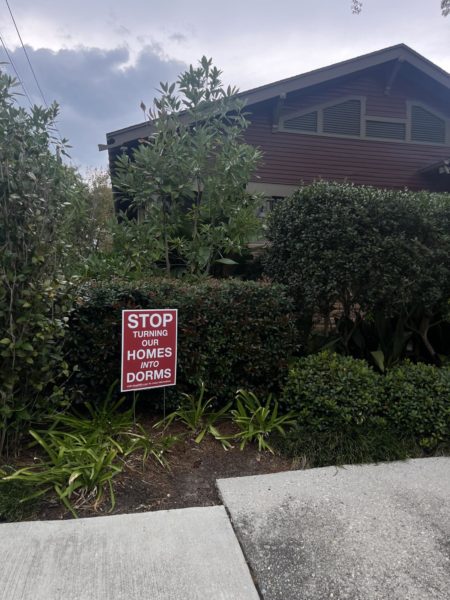
“Stop Dorms to Doubles” signs can be spotted walking west of Broadway Street. These signs protest one of the most contentious issues in New Orleans’ Uptown area: the conversion of double family homes into high-capacity off-campus residences for students of Tulane University and Loyola University of New Orleans.
Locals against the expansion of off-campus student housing believe it causes a lack of parking, trash left on streets, higher rent and subpar neighbors.
Maple Area Residents, Inc. is a neighborhood organization that has taken a stance against the expansion of student housing. It argues housing developers can manipulate permits to fit more residents in a house than designed, then charge student renters $1,200 to $1,500 per room.
“Our diversity is being diminished and may be destroyed because the previous affordable housing is being bought by half a dozen developers, who are ignoring code construction,” MARI President, Pierre Walker III said. “In some cases, [developers] actively manipulate the Department of Safety and Permits personnel [to replace] single-family homes and apartments originally intended for New Orleanians, into pricey, yet firetrap ‘dormitories’ for student housing.”
According to Walker, out-of-state developers are converting unique New Orleans homes into standardized living for students and raising the cost of rent.
Amicus Properties is a nationwide renovation and rental company based in New York City that specializes in student off-campus housing. It was founded by Austin Brooks in 2016 to provide students with “comfortable, safe housing alternatives while preserving the integrity of local college towns.”
Amicus Properties owns twelve properties in the Tulane area, one of the most of any developer in the area. With the exception of one property, Amicus Properties does not build housing from the ground up. Therefore, Brooks said he “would call it renovate” instead of “develop” when referring to Amicus’ work.
“We just renovate the existing houses that are there. So usually what we’re doing is putting in new kitchens and bathrooms [or] refinishing the floors,” Brooks said.
Brooks said the high cost of housing stems from the city not allowing the addition of bedrooms. He cited the economic theory of supply and demand, saying that if there were enough housing supplied to meet the student’s demand, the prices would be lower.
“What the community has done is they’ve made it so hard for us to add bedrooms or add supply, which is basic economics. That’s what brings prices down,” Brooks said. “So the supply is so constrained that housing in the area is getting expensive because there just isn’t enough.”
Others argue the addition of bedrooms would cause housing prices to increase. With more students living in one house, rent can be split with each student paying a fraction of total rent. More students in one house may encourage landlords to drive the price up knowing there are more people paying.
Frederick Kusin, local real estate agent who lives on Willow Street, said that when multiple students live in one house, “They can afford a little bit more money,” subsequently “bring[ing] that higher [rent] rate to the whole neighborhood.”
Local residents said they are dissatisfied with students as neighbors. They said students are less invested in the neighborhoods because, unlike residents, they only live there temporarily.
Sandy Furano, a local resident, has seen Uptown grow and change over her lifetime. She was born in Uptown New Orleans to a mother that graduated from Newcomb College, Tulane’s former women’s coordinate college. She recently moved back to New Orleans into a home on Willow Street.

“I think the [home]owners that are rejecting [student housing] so much, is a sense of students not having ownership or vested interest in the upkeep of the neighborhood,” Furano said. “You’re not worried about cleaning the street, or taking your trash out.”
Furano’s husband once organized a street clean-up for their community.
“Everyone participated but the students,” Furano said.
“The only issue that I have as a homeowner, personally, is on trash days,” Kusin said. “[Students] don’t bring their garbage cans back. So after the garbage man picks up the trash, that garbage can will sit out there for five or six days.”
Despite the complaints, many recognize that students need to live somewhere, especially since Tulane cannot accommodate all upperclassmen living on campus.
“Living off campus is really important for students,” Brooks said. “It’s kind of like that bridge between starting college and then entering the real world.”
“[Living off campus has] been a good experience,” Junior Leah Kaplan, who is living in a home on Broadway Street mostly surrounded by other student housing, said. “It’s been a good way to be more independent.”
“There’s a saying that fences make good neighbors but instead, students can be great neighbors,” Furano said.



Leave a Comment